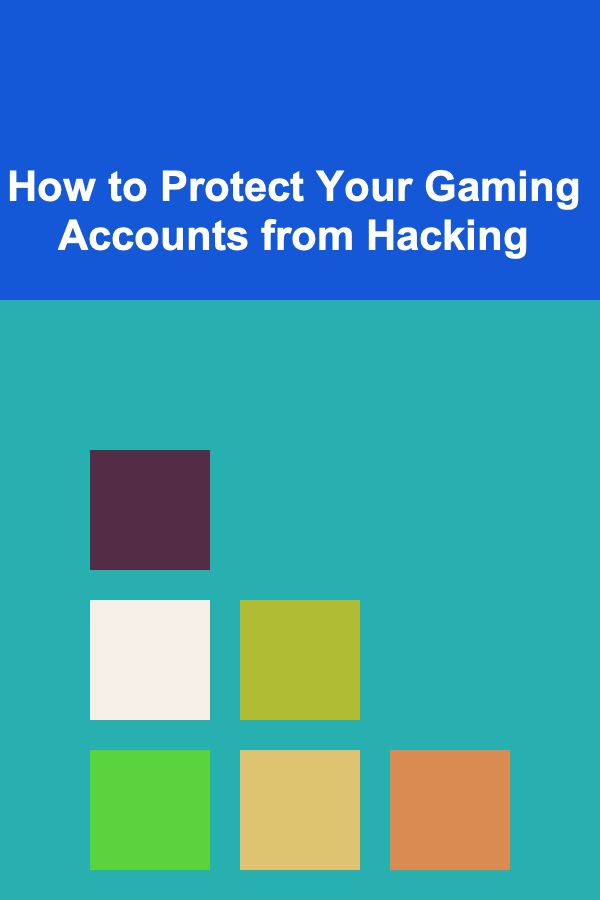
How to Protect Your Gaming Accounts from Hacking
ebook include PDF & Audio bundle (Micro Guide)
$12.99$6.99
Limited Time Offer! Order within the next:

In the digital age, the allure of online gaming has captivated millions of players worldwide. With vibrant multiplayer experiences, online competitions, and in-game economies, gaming has become more than just a hobby---it's a way of life for many. However, with the growth of online gaming has come the rise of cyber threats, particularly hacking. Gaming accounts, much like any other online accounts, are susceptible to various forms of cyberattacks. Protecting your gaming accounts from hacking is not only crucial to ensure a seamless gaming experience but also to safeguard your personal information, valuable in-game assets, and hard-earned progress.
In this article, we'll dive into why gaming accounts are targeted, explore common hacking techniques, and provide a thorough guide on how to protect your accounts from potential threats.
Why Gaming Accounts are Targeted by Hackers
Before understanding how to protect your gaming accounts, it's important to first grasp why they are attractive targets for hackers. There are several reasons behind this:
- In-Game Currency and Items: Many games feature virtual currencies and rare items that can hold real-world value. Hackers target these items for resale on black markets or to enhance their own in-game progress.
- Player Data: Beyond in-game items, gaming accounts often contain personal information such as email addresses, payment details, and sometimes even social media links. This data is valuable for hackers who aim to steal identities or engage in phishing schemes.
- Popularity of Online Gaming: With millions of players across various platforms, the sheer number of gaming accounts provides hackers with a large pool of potential victims. The more popular the game, the higher the chances of exploitation.
- Lack of Security Awareness: Many gamers, especially casual players, may not be fully aware of the security risks or may underestimate the importance of account protection. This makes them more vulnerable to attacks.
Common Hacking Techniques Used on Gaming Accounts
Understanding the methods hackers use to infiltrate gaming accounts can help you better protect your data. Below are some of the most common hacking techniques:
1. Phishing Attacks
Phishing is one of the most common ways hackers gain access to gaming accounts. This method involves tricking users into divulging sensitive information such as login credentials, personal details, or payment information. A phishing attack might come in the form of an email that appears to be from the game developer, a link to a fake login page, or even social media messages.
2. Credential Stuffing
Credential stuffing is an attack where hackers use lists of stolen usernames and passwords from other breached sites to try to log into gaming accounts. Since many players use the same credentials across multiple platforms, hackers can take advantage of these reused passwords to gain unauthorized access.
3. Malware and Keyloggers
Malware can be used to infect a player's device, allowing hackers to monitor keystrokes, capture login details, or even take control of the system. Keyloggers are a type of malware that records every keystroke a user makes, potentially capturing login credentials or credit card information.
4. Social Engineering
Hackers often use social engineering to manipulate gamers into providing sensitive information. This might involve pretending to be a customer service representative from the game's support team or posing as a fellow player offering assistance.
5. DDoS (Distributed Denial of Service) Attacks
While primarily a tool for disrupting online services, DDoS attacks can also be used as a distraction. Hackers might use a DDoS attack to overload servers, which in turn could allow them to gain unauthorized access to accounts while the servers are busy dealing with the attack.
Best Practices to Protect Your Gaming Accounts
1. Enable Two-Factor Authentication (2FA)
One of the most effective ways to secure your gaming accounts is by enabling Two-Factor Authentication (2FA). 2FA adds an extra layer of protection by requiring you to verify your identity using something you have (such as a mobile device) in addition to your password. Even if a hacker manages to obtain your password, they would still need access to your second factor to log in.
Most major gaming platforms, such as Steam, PlayStation Network (PSN), Xbox Live, and Epic Games, offer 2FA options. This step significantly reduces the risk of unauthorized access.
2. Use Strong, Unique Passwords
Using a unique and strong password for each of your gaming accounts is essential. Avoid using simple, easily guessable passwords such as "password123" or using the same password across multiple sites. A strong password should be a combination of uppercase and lowercase letters, numbers, and special characters.
Tools like password managers can help generate and store complex passwords, ensuring you don't have to remember every single one.
3. Be Wary of Phishing Attempts
Since phishing is a popular attack method, it's important to stay vigilant. Never click on links in unsolicited emails or messages from unknown sources. Instead, go directly to the official website of your gaming platform to check for any updates or changes to your account. Additionally, if you receive any suspicious messages, report them to the platform's support team.
4. Enable Account Recovery Options
Set up your account recovery options ahead of time. This might include linking your account to a valid email address and adding a recovery phone number. In case your account gets compromised or you forget your password, these recovery options can help you regain control.
5. Keep Software Updated
Hackers often exploit vulnerabilities in outdated software. Whether it's your gaming platform's client, your browser, or your operating system, make sure they are always up to date with the latest security patches. This minimizes the chances of a hacker taking advantage of known vulnerabilities.
6. Avoid Public Wi-Fi for Gaming
Public Wi-Fi networks are often unsecured, which makes them a prime target for hackers looking to intercept data. Avoid logging into your gaming accounts when connected to public Wi-Fi. If you must use public Wi-Fi, consider using a Virtual Private Network (VPN) to encrypt your data and protect it from prying eyes.
7. Be Cautious with Third-Party Apps and Plugins
Many third-party applications and plugins can enhance the gaming experience, but they can also pose a security risk. Only download apps and tools from trusted sources and make sure to read reviews before installing them. Some apps can carry malware or act as a backdoor for hackers to access your accounts.
8. Monitor Account Activity
Regularly check your account activity for any signs of suspicious behavior. Most gaming platforms allow you to view login history, purchases, and changes to your account settings. If you notice any unfamiliar activities, take immediate action by changing your password and contacting support.
9. Educate Yourself and Others
Knowledge is your best defense against hacking. Stay informed about the latest security threats and educate your friends and family, especially those who may not be as tech-savvy. Encourage them to use the same best practices, such as enabling 2FA and using strong passwords, to create a more secure gaming environment.
10. Keep Backup Copies of Important Information
If your account contains valuable in-game items or progress, it's a good idea to keep backup copies or notes. Some games offer cloud storage or external backups for your game data, allowing you to restore your account in the event of a breach.
What to Do If Your Account is Hacked
Despite taking every precaution, it's still possible for your gaming account to be hacked. In the event that it happens, here are the steps you should take immediately:
- Change Your Password: If you still have access to your account, change your password immediately. Make it stronger and unique.
- Contact Support: Reach out to the game's support team as soon as possible. Provide them with details about the breach and ask them to help you regain access to your account.
- Enable 2FA: If you haven't already, enable Two-Factor Authentication (2FA) as soon as possible to prevent further unauthorized access.
- Scan for Malware: Run a full antivirus scan on your devices to ensure that no malware or keyloggers were installed during the attack.
- Check for Fraudulent Activity: Review your in-game purchases, currency transactions, and personal information to ensure there are no fraudulent actions tied to your account.
Conclusion
Gaming accounts are an attractive target for hackers, but by following the steps outlined in this article, you can significantly reduce the risk of having your account compromised. Protecting your account with strong, unique passwords, enabling Two-Factor Authentication, and being cautious of phishing attempts are just a few of the essential steps to take. Remember, the more proactive you are about securing your gaming accounts, the less likely you are to fall victim to a cyberattack. Stay vigilant, educate yourself on the latest threats, and enjoy a safer gaming experience.
Other Products

How to Build a Home Storage System for Your Electronics
Read More
How to Create a Soundproof Section in Your Workspace
Read More
How to Make the Most of Limited Trunk Space
Read More
How to Organize Shared Bathroom Essentials
Read More
How to Save Money by Cutting Out Expensive Habits
Read More